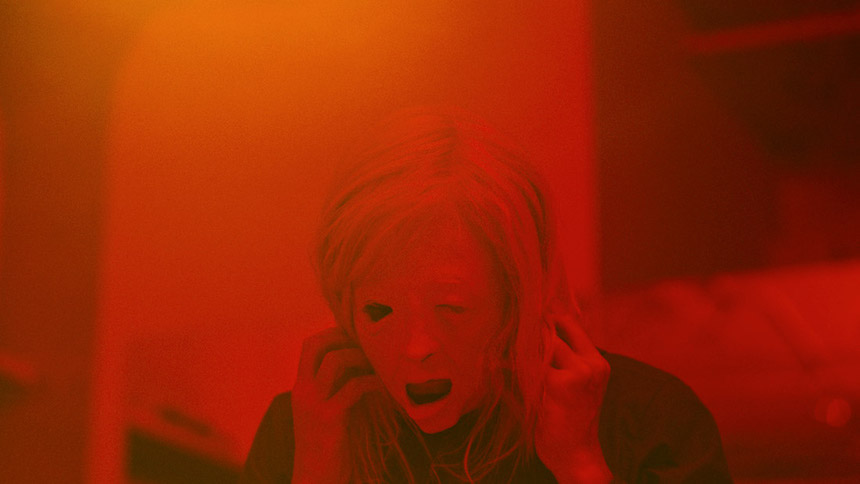Sundance 2020 Review: POSSESSOR Confirms Brandon Cronenberg's Status As a Singular Talent
Andrea Riseborough stars in Brandon Cronenberg's horror picture, which will leave even the most jaded, cynical audiences shattered, shook, and devastated.

It’s been almost a decade since Brandon “son of David” Cronenberg introduced himself to unsuspecting audiences with the deliberately provocative, confrontational, repellent Antiviral.
Eagerly, not to mention gladly, adopting his father’s long-abandoned mantle as the philosopher-king of body-horror (a sub-genre David may not have originated or defined [that honor belongs to film scholar Linda Williams], but certainly perfected over the better part of two decades), Brandon Cronenberg decided to revisit his father’s decades-long obsession with the human body and its myriad permutations, modifications, and mutations, adding his own twisty philosophical, political, and cultural ideas in the process.
Antiviral also uncovered Brandon’s surprisingly felt concerns that went beyond merely imitating his father’s deliberate excesses as a filmmaker. Antiviral revealed Brandon’s anti-corporate, anti-capitalist, and anti-consumerist politics, similar political stances at the forefront of his long-anticipated, startlingly singular second film, Possessor. As self-consciously subversive and disquieting as anything found in his father’s decades-long oeuvre (a compliment, in case you’re wondering), Possessor confirms the younger Cronenberg as one of the most provocative talents working in or out of the horror genre.
Set in a bleak, near-future dystopia where monopolistic corporatism regulates public and private life (like Rollerball, but minus the roller-balling) – a social media/information/consumer-oriented company (part Google, part Facebook, and part Amazon) rules with faux-benevolence – Possessor centers on Tasya Vos (Andrea Riseborough), a wholly-owned and operated assassin in the employ of a soulless corporation that specializes in murders-for-hire (“Do evil,” contra Google’s long-abandoned motto).
Via lo-fi, analog brain-implant tech, Tasya takes over the bodies of unsuspecting, unwitting marks (or hosts) and literally drives them to commit profit-oriented assassinations, sometimes for cold, hard cash, sometimes for shares in a publicly-traded company (redefining the phrase “hostile takeover”). When Tasya isn’t committing parasitical, corporate-sanctioned murder for profit, she’s trying to repair a broken relationship with her academic ex-husband, Michael (Rossif Sutherland), and her preteen son, Ira (Gage Graham-Arbuthnot).
Those moments of respite and normality, however, fail to convince Tasya to leave the corporate assassination gig behind and reintegrate herself into her ex-husband and son’s lives (for reasons Cronenberg leaves intentionally ambiguous). There’s always a new corporate, always a new target to eliminate. Even then, bleed between Tasya’s non-corporate life and her host’s life experiences threaten to destabilize her increasingly fragile mental and emotional state.
For Tasya, every hit comes with a potential life-altering or life-ending risk, potentially leaving Tasya marooned or stranded in a host body to face the consequences of her avatar’s real-world actions. An unbroken link can also cause irreparable brain damage if the link between controller and host isn’t severed in time.
That inherent possibility – spelled out early in Possessor – becomes Tasya’s worst nightmare when she loses partial control of her mark/target, Colin (Christopher Abbott) moments after he/she attempts to assassinate John Parse (Sean Bean), the CEO of the aforementioned mega-tech company, after a lavish dinner party in his home. Possessor turns on the extended life-or-death battle between Tasya and Colin for ultimate control of Colin’s body. To borrow Highlander’s tagline, “There can only be One.” Even as they vie for control, Colin/Tasya go on the run from both the authorities and corporate spies working for Tasya’s employer.
With Possessor, Brandon Cronenberg leaves little doubt about his talents or skill as a narrative filmmaker. Every line, every character tic, every element of the frame reflects Cronenberg’s uncompromising, nihilistic vision of a near-future where every life doesn’t have intrinsic value, only an economic/market one, to borrow a phrase from Blade Runner, “either a benefit or a hazard,” except replicants don’t exist in the world of Possessor, though if they did, everyone, regardless of biological origin, would be valued - or rather devalued - similarly.
It’s an ugly, dispiriting lesson that Colin and Tasya eventually learn to opposite, contradictory results. In a near-future where human life has only economic value (“means, not ends”), violence, brutal, bloody, and gory, is all but certain to follow.
And like his filmmaker father, Cronenberg approaches the depiction of violence in Possessor with detached, clinical precision, devoid of emotional connection or reaction (by the characters, if not the audience), and with a hyper-realism that will leave even the most jaded, cynical audiences shattered, shook, and devastated by Possessor’s near-future dystopia, just as the younger Cronenberg intended (amen).







